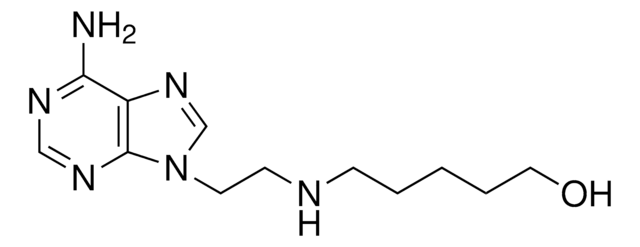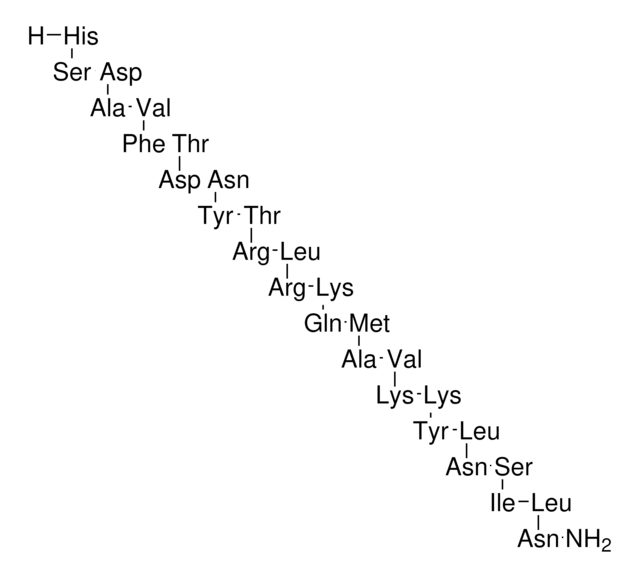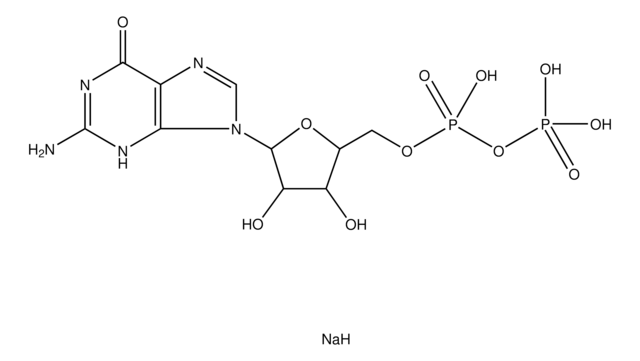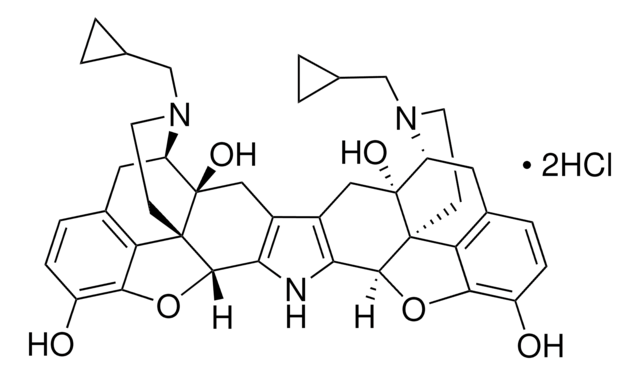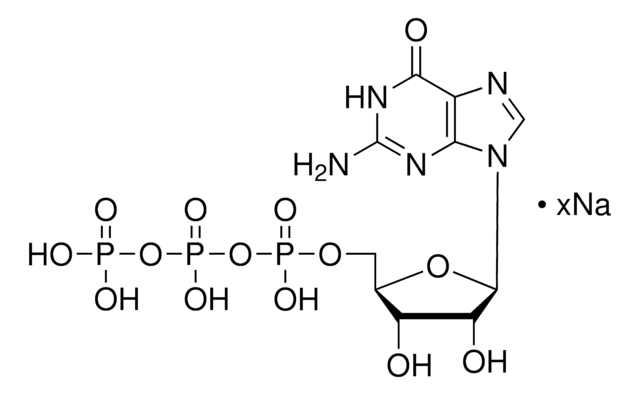A1439
Pituitary adenylate cyclase activating polypeptide-38
Synonym(s):
PACAP-38
Sign Into View Organizational & Contract Pricing
All Photos(1)
About This Item
Empirical Formula (Hill Notation):
C203H331N63O53S
CAS Number:
Molecular Weight:
4534.26
MDL number:
UNSPSC Code:
41106305
NACRES:
NA.32
Recommended Products
form
powder
Quality Level
composition
Peptide content, ~70%
UniProt accession no.
storage temp.
−20°C
Gene Information
human ... ADCYAP1(116)
Amino Acid Sequence
His-Ser-Asp-Gly-Ile-Phe-Thr-Asp-Ser-Tyr-Ser-Arg-Tyr-Arg-Lys-Gln-Met-Ala-Val-Lys-Lys-Tyr-Leu-Ala-Ala-Val-Leu-Gly-Lys-Arg-Tyr-Lys-Gln-Arg-Val-Lys-Asn-Lys-NH2
General description
Pituitary adenylate cyclase activating polypeptide-38 (PACAP38) is mapped to human chromosome 18. 27-residue-amidated fragment (PACAP27) comprises another isoform. The PACAP38 is major isoform associated with mammals.
Application
Pituitary adenylate cyclase activating polypeptide-38 has been used to test its effect in stimulating the formation of cyclic AMP hypothalamus and cerebral cortex slices of chicken and to treat glioblastoma cells (U87MG) in cell migration assay to test its anti-invasive effects.
Biochem/physiol Actions
Pituitary adenylate cyclase activating polypeptide-38 (PACAP38) is a cardioprotectant and may help in treating radiation-induced heart disease (RIHD). It plays a protective role during oxidative stress in cardiomyocytes. PACAP38 has antioxidant, anti-apoptotic and anti-inflammatory property. It is implicated in the pathophysiology of migraine and cluster headache.
PACAP-38 is a neuropeptide that has substantial sequence homology to vasoactive intestinal peptide (VIP). It is reported to serve as a neuronal survival factor.
Other Notes
Lyophilized from 0.1% TFA in H2O
Storage Class Code
11 - Combustible Solids
WGK
WGK 3
Flash Point(F)
Not applicable
Flash Point(C)
Not applicable
Personal Protective Equipment
dust mask type N95 (US), Eyeshields, Gloves
Certificates of Analysis (COA)
Search for Certificates of Analysis (COA) by entering the products Lot/Batch Number. Lot and Batch Numbers can be found on a product’s label following the words ‘Lot’ or ‘Batch’.
Already Own This Product?
Find documentation for the products that you have recently purchased in the Document Library.
Customers Also Viewed
Eloisa Rubio-Beltrán et al.
The journal of headache and pain, 19(1), 64-64 (2018-08-09)
Pituitary adenylate cyclase activating polypeptide-38 (PACAP38) is a widely distributed neuropeptide involved in neuroprotection, neurodevelopment, nociception and inflammation. Moreover, PACAP38 is a potent inducer of migraine-like attacks, but the mechanism behind this has not been fully elucidated.Migraine is a neurovascular
J Kinhult et al.
The European respiratory journal, 15(2), 243-247 (2000-03-08)
Pituitary adenylate cyclase-activating peptide (PACAP) 38 displays several biological activities relevant to obstructive airway disease. In this study, the occurrence of PACAP 38 in human small bronchi and corresponding pulmonary arteries was analysed immunocytochemically. The dilatory effects of this peptide
Grazia Maugeri et al.
Biomedicines, 9(8) (2021-08-28)
Pituitary adenylate cyclase-activating polypeptide (PACAP) exerts different effects in various human cancer. In glioblastoma (GBM), PACAP has been shown to interfere with the hypoxic micro-environment through the modulation of hypoxia-inducible factors via PI3K/AKT and MAPK/ERK pathways inhibition. Considering that hypoxic
T Dickinson et al.
Neuropharmacology, 38(1), 167-180 (1999-04-08)
Peripheral nerve damage often results in the development of chronic pain states, resistant to classical analgesics. Since vasoactive intestinal polypeptide (VIP) and pituitary adenylate cyclase-activating polypeptide (PACAP) are up-regulated in dorsal root ganglion cells following peripheral nerve injury, we investigated
L M E Pettersson et al.
The European journal of neuroscience, 20(7), 1838-1848 (2004-09-24)
In the present study, expression of pituitary adenylate cyclase-activating polypeptide (PACAP) in rat dorsal root ganglion (DRG) neurons and sciatic nerve following experimental sciatic nerve compression was studied with the use of quantitative immunohistochemistry and in situ hybridization. Previously, we
Our team of scientists has experience in all areas of research including Life Science, Material Science, Chemical Synthesis, Chromatography, Analytical and many others.
Contact Technical Service